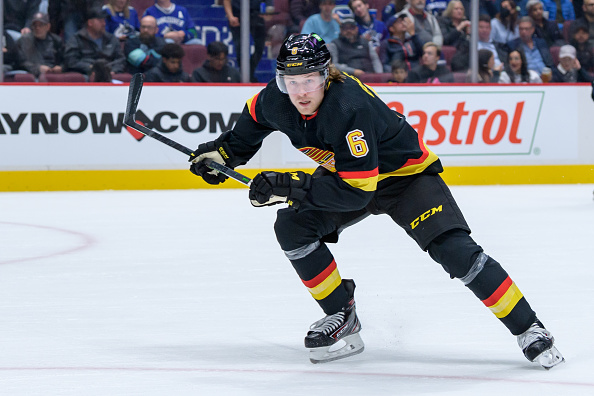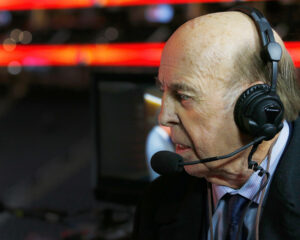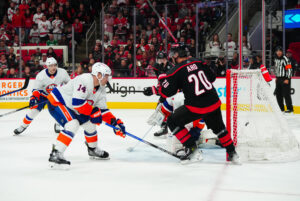The Vancouver Canucks off-season may hinge on J.T. Miller, but the Brock Boeser contract question demands a more immediate answer. And there is a variety of those to choose from.
Boeser Answers Many Questions
Brock Boeser had a down season this year. Of course, for him, a “down” season includes 23 goals and 23 assists. All things being relative, that’s a substantial drop from 23 goals and 49 points in 15 fewer games a year ago. His shooting percentage was down a little this season – while still being around 12% – and it took him a little while to get going. Like everyone else on the team.
With the mid-season coaching change, most of the line combinations were juggled more often than normal. The only trio of forwards to stick for more than 200 minutes was Tyler Motte – Juho Lammikko – Matthew Highmore. But behind them was Brock Boeser – J.T. Miller – Tanner Pearson. And those three were effective. When they were on the ice, they had a 58% expected goals rating by MoneyPuck‘s metrics. His expected goals per 60 minutes were the highest on the team.
A lot of that lines up with his play. He added a lot of “chase” to his game in the attacking zone, willing to go get the puck on the boards. He is a surprisingly strong player, taking punishment to score in the blue paint that is his favourite haunt. And he has that special Brett Hull ability to somehow make the other team forget he’s on the ice. There’s no other explanation for how he’s suddenly open in the slot once or twice a game.
While there is a multitude of aspects to consider, as always the Brock Boeser contract question comes down to one thing.
Keep #6 or Deep-Six?
All that being said, 23 goals is just 23 goals. That number barely gets him into the top 100 scorers in the league for 2021-22. That number is fine for a second-line winger who’s playing with Pearson. Not for a top-line guy playing with Miller or Elias Pettersson. And this year, he’s getting paid like that first-line guy.
Boeser is extremely talented, there’s no question. He has the skill to play on any top line. But he hasn’t been able to get consistent production, on a year-to-year basis like his talent says he should. After five full seasons, his best ‘boxcar stats’ are still from 2017-18 as a rookie. In theory, what we see is what he is, and that could be a very good second-line winger. And while that’s a great thing to have on your team, it’s not exactly what Vancouver expected. It’s also not what Vancouver needs right now.
Give Us Money
Boeser’s overall play has been pretty good value for his cap hit of $5,875,000. When he was on the ice his line generated more chances than the opponent. He piled up power-play goals. While he’s not the fastest guy he wasn’t caught on his heels defensively. But the issue isn’t his cap hit; it’s his paycheque.
Boeser’s in the final year of his three-year deal, and it’s paying him $7.5 million. That’s the qualifying offer the Canucks have to make to him – without arbitration – to retain his services. Which brings us to the crux of any Brock Boeser contract: is he worth it? The answer, unfortunately, is no. Or not yet, anyway.
Either side can take the other to arbitration, but no one wants that to happen. Yes, the Canucks can get a slight reduction in his pay, but at the cost of arbitration. That’s never a pretty sight, and most teams try to avoid it, given the damage it can do to their relationship with the player. Plus Boeser can choose to accept the ruling for one year, becoming a free agent in 2023. It’s a no-win for the team, and obviously, Boeser isn’t going to select arbitration himself. Rulings often go with the obvious stats, and his weren’t great this year.
From Russia With Savings
For an added bonus, the Canucks are frontrunners in the Andrei Kuzmenko sweepstakes.
The Canucks are a finalist to land free agent Andrei Kuzmenko.
They have made the shortlist of teams, decision is still a few weeks away according to agent Dan Milstein.
— Rick Dhaliwal (@DhaliwalSports) May 11, 2022
He shares an agent with prospect Danila Klimovich, who is currently in the Canucks system with Abbotsford. While the 26-year-old is no high-flying prospect, he does have NHL-level skills. He finished second in KHL scoring this year with 20 goals and 53 points in 45 games. Where exactly he’ll end up in the NHL is unknown, but by all accounts, he will be a good middle-six winger. If the Canucks think he’s a fit for the second line – and they can land him – they’ll happily take it.
Because of the entry agreement, Kuzmenko can only sign a one-year, entry-level contract. That puts him at $925,000 in base salary, with bonuses that can push it up to $2 million or so, depending on what he and the team agree to. Which, for the mathematically inclined, is an awful lot less than $7.5 million. Kuzmenko isn’t as good as Boeser is. But if he’s almost as good for a quarter the price?
The same math is going to apply to whichever players Vancouver looks at. As much as Miller is talked about as a centre, he’s more effective as a winger. And with his contract coming up in one season… It’s not just a Brock Boeser contract question. It’s also a J.T. Miller contract question, a Conor Garland contract question, and even a Bo Horvat contract question.
The Answer
What we’re going to guess is that a three-year deal gets done between Vancouver and Boeser. If it’s close to the cap hit he currently has – up to, say, $6.25 million – that’s a win for the team. He has all the talent to fulfill the deal at that value while still being young enough to cash in when it’s over if he earns it. Anything else, and he may not see his new deal start in Vancouver.






